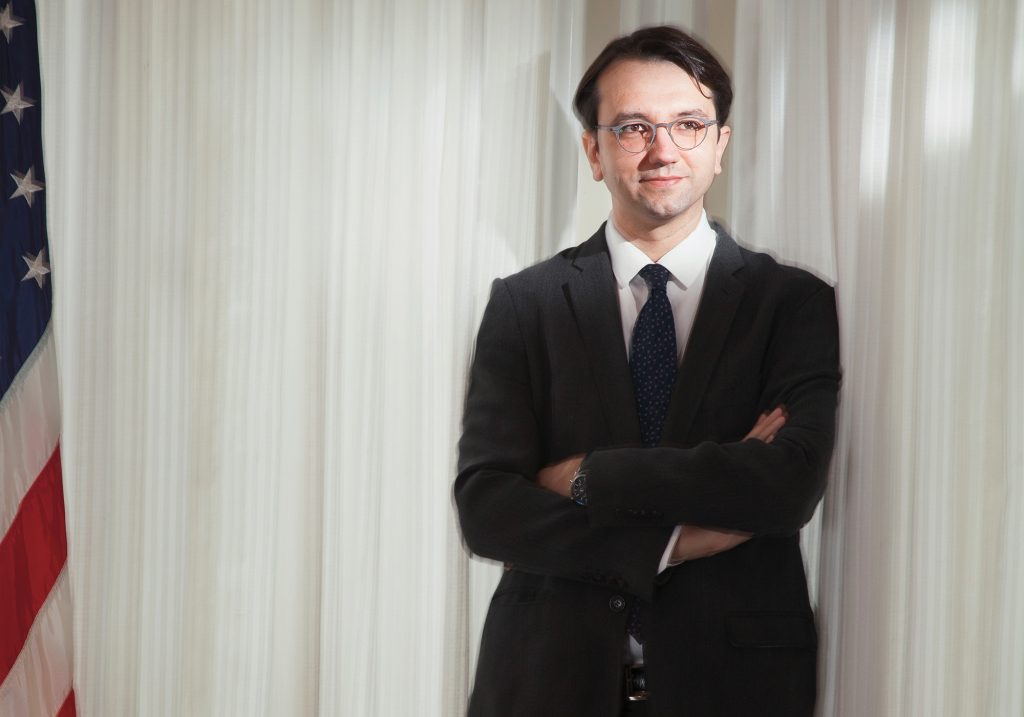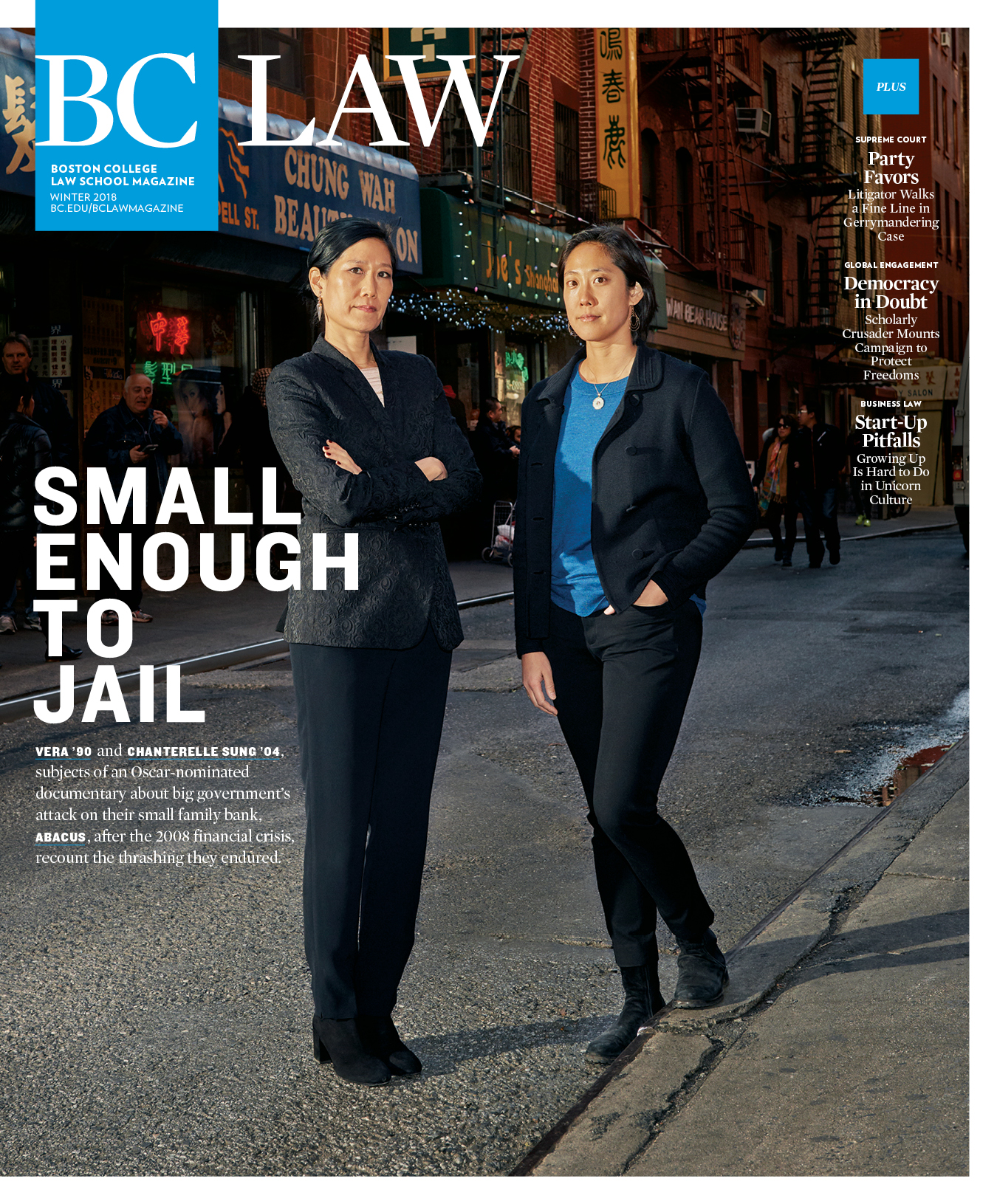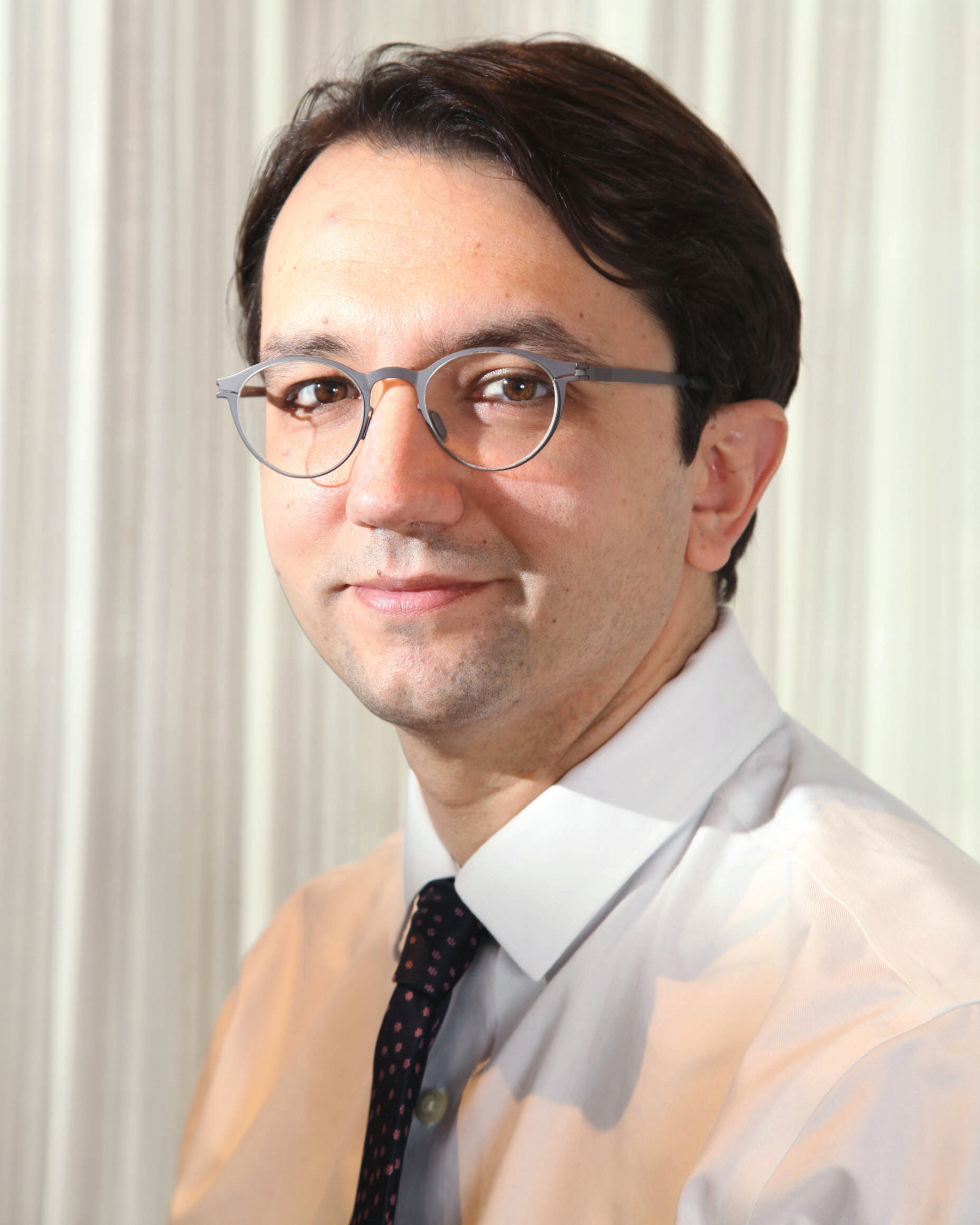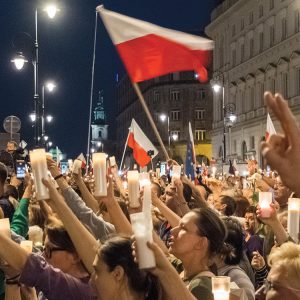December 22, 1989, was a big day for eleven-year-old Vlad Perju. His family had been waiting for two decades to buy a new car. That’s just the way things were in Romania under Communist dictator Nicolae Ceausescu. Now the day had finally arrived, and he and his family were off to the dealership.
What Vlad could not have known was that history would change that very day. A week earlier, a mass protest had erupted in the Romanian city of Timisoara. Ceasescu ordered troops to fire. Dozens of protesters were killed, sparking demonstrations throughout the country. On the very hour the Perju family was gathered at the car dealership, the revolution hit the capital of Bucharest. “When they announced on the radio that ‘the dictator had fled,’ all the people there jumped to hug and kiss me—I was the only child there—saying this was too late for them, but for me, this was going to mean freedom,” Perju recalls. “And they were right.”
What Perju experienced in Romania shaped what he would eventually make his life’s work: exploring the development of constitutional democracy as a field of study, which he does as a professor at BC Law and as the director of BC’s Clough Center for the Study of Constitutional Democracy. “What happened to my country was a fundamental question that drew me to politics more generally,” Perju says. He wanted to know how law shaped society, how law interacted with culture, and how different societies interacted with each other. Today, he teaches modern legal theory, European Union law, and American constitutional law, publishes extensively on comparative constitutional law and theory, presents his scholarship at conferences as far away as Rome, Melbourne, and Prague, and runs a singular program addressing the growing threat to constitutional democracy worldwide.
For Perju, that threat centers most recently on the problem of populism. Populism, he says, “plays by the rules set out by the constitution but is contrary to the spirit of a constitutional democracy—contrary, that is, to the pluralism that animates the project of constitutional democracy.”
As an example, Perju cites Prime Minister Viktor Orbán’s efforts to undermine the judicial independence of Hungary’s Constitutional Court. “He pushed out a large number of judges by imposing a new age limit for retirement,” Perju explains. “Orbán then naturally proceeded to appoint new constitutional judges loyal to his agenda, in addition to continuing to curtail the court’s jurisdiction and powers.” Populism, in other words, is a kind of constitutional hardball. “It attempts to push legal rules to the breaking point,” Perju says. It endangers the constitutional democracy, and it is contagious across borders. “One only has to look at developments this past summer, from Turkey to Venezuela and from Hungary to Poland, to get a sense of the magnitude of this challenge,” he says.
The Clough Center for the Study of Constitutional Democracy was established in 2007 by Gloria and Charles Clough for the express purpose of meeting that challenge by reinvigorating and reimagining the study of constitutional democracy in the twenty-first century.
Charles Clough, chair and CEO of the investment firm Clough Capital Partners, is a student of history and a world traveler. His thinking has been influenced by some of the greatest events of his lifetime: the collapse of the Soviet Union, the rise of Nelson Mandela as the leader of a free South Africa, the plight of China in the 1980s. Clough observes that at the turn of this young century, constitutional democracy seemed to be in pretty good shape all over the world, but that has been changing. “Today, we see it under assault, even in the US,” he says. “A smaller percentage of citizens in the Western world view democracy as necessary for personal freedom, human rights, prosperity, and economic development. Democracy is anything but assured in the modern world.”
The Clough Center reflects Clough’s choice to support constitutional democracy through study and the development of young people: “I thought the academic approach would have more long-lasting effect than trying to do something in the political sphere,” he says. Perju’s experience and interests dovetailed with Clough’s, a timely coincidence that led to Perju’s appointment as the center’s director in 2012.
Perju’s goal is an ambitious one: to make the center one of the most significant and important institutions for the study of constitutional democracy in the world. “The university is fully behind that vision,” Perju says. “We have done our very best over the past four or five years to become that—that is, to organize as many conferences as we can, to always see through what comes out of those conferences, to bring the people who ask the most urgent and important questions of our time, and to integrate students into the work that we do and to rely on their originality and their energy to push us forward.”
The center brings to its conferences and symposia world-renowned speakers like Nobel-laureate Amartya Sen, foreign policy analyst Anne-Marie Slaughter, former New York Times executive editor Bill Keller, poet and Guggenheim Foundation president Edward Hirsch, lawyer and political scientist Ayelet Shachar, and more. Additionally, the center provides fellowships for graduate students, academic law fellowships for law students, and law scholarships for law students engaging in pro bono summer public interest work. The center also provides travel grants to faculty, undergraduates, and graduate students to attend conferences and pursue research around the world.
Perju’s goal is an ambitious one: to make the Clough Center one of the most significant and important institutions for the study of constitutional democracy in the world.
“I think the role that scholars and intellectuals play in conversations about the challenge to constitutional democracy in our time is essentially the same role that scholars and intellectuals have always played in history—which is to bring knowledge, to bring expertise, to bring a certain coolness of intellect to the problems the world is facing,” Perju says.
The Clough Center was one of the first places anywhere to hold a conference about populism with leading Central and Eastern European constitutionalists. Papers from that conference were published in a special issue of the renowned International Journal of Constitutional Law. Another conference brought together major editors and journalists from some of the world’s greatest newspapers to look at the decline of foreign reporting. With the center’s open-source mindset, anyone, anywhere in the world can access the Clough Archive and learn about events, conferences, and people working on issues relevant to constitutional democracy, and view full lectures on the center’s YouTube channel.
The Clough Center is also home to the Clough Distinguished Lectures in Jurisprudence series. Associate Professor of Law Paulo Barrozo was tasked by Perju with the development of the series, a joint venture with the Law School. That program has brought to the law campus Australian Justice Michael Kirby (“North Korea through a Jurist’s Eye”); Brazilian Supreme Court Justice L.R. Barroso (“The Roles of Supreme Courts in Constitutional Democracies”); professor, editor, and author Michael Walzer (“What Is the Responsibility to Protect? And What Does It Mean in Syria?”); and many more. The Clough Center, Barrozo says, has put Boston College Law School “at the forefront of the most significant, sophisticated debates and legal thought going on” today.
Barrozo himself was born in Brazil when it was under military rule and saw his country struggle with the transition to constitutional democracy. He says that constitutional democracies are vulnerable to the cyclical susceptibility of people to leaders who offer simple answers in a complex world. He believes that we are again at that point in the cycle where people are falling for simplifiers. What’s new today, however, is that our world is globalized. “So,” he says, “we have these two challenges in our hands right now. One is many feel that they need someone who can simplify life for them. The Trump administration in the United States is a good example of that. On the other hand, we need to rethink the institution we have inherited for the new world in which we live.”
The Clough Center’s response is decidedly complex and interdisciplinary. Such thinking comes naturally to Perju, cultivated when he was still in Romania, where he and a handful of extraordinary teachers and friends read and studied things not taught in Romanian schools. He learned that there is a unity to human knowledge that defies disciplinary boundaries, an understanding that he applies vigorously to Clough’s programming. “Some of the most interesting and intriguing progress that we have seen in the academy has been of the kind that transcends these kinds of boundaries,” Perju says.
In that spirit, the Clough Center regularly brings together political scientists, lawyers, historians, theologians, philosophers, sociologists, literary scholars, musicians, and artists. Even mathematicians are getting in on the act: the Law School, the Math Department, and the Political Science Department recently co-sponsored a Clough Center event looking at the mathematics of partisan gerrymandering.
Students with interdisciplinary interests are finding a supportive home at the Clough Center. Kelly Morgan ’18, for example, is pursuing a dual degree in law and social work. A public interest law scholar, she also serves as the center’s law fellow coordinator. She’s writing a law review article on the emergence of national security programs that use social services to try to identify whether someone will become a “violent extremist.”
At one of the Clough Center’s weekly workshops where graduate students have their scholarly writings critiqued by peers, Morgan presented a draft of her article. It received a thorough going-over by graduate students and faculty from departments from all over the university. Describing her thesis, Morgan says, “I was starting from an assumption that violating people’s privacy is wrong, that singling out people on account of religion is wrong.” Her workshop colleagues encouraged her to dig deeper, to go beyond claiming these things are wrong to exploring why and in what ways they are wrong. “People were very engaged and gave thoughtful feedback,” she said. “I remember even afterwards that several people wanted to meet up and discuss the topic more. It was a very intellectual, really helpful group to be part of.”
Scott Reznick, a PhD candidate in English and the Clough Center’s Graduate Fellow Coordinator, describes a similar experience. “What will often happen at about thirty-five to forty minutes into a discussion, once a lot of the issues have been brought out and a lot of people start disagreeing with each other, Vlad will come in with his immense learning and his very keen wit and will put your paper into the larger arc of human thought as it has unfolded over the past 300 to 400 years,” Reznick says. “It is always so eye-opening to see how he does that with papers that are so different in nature.”
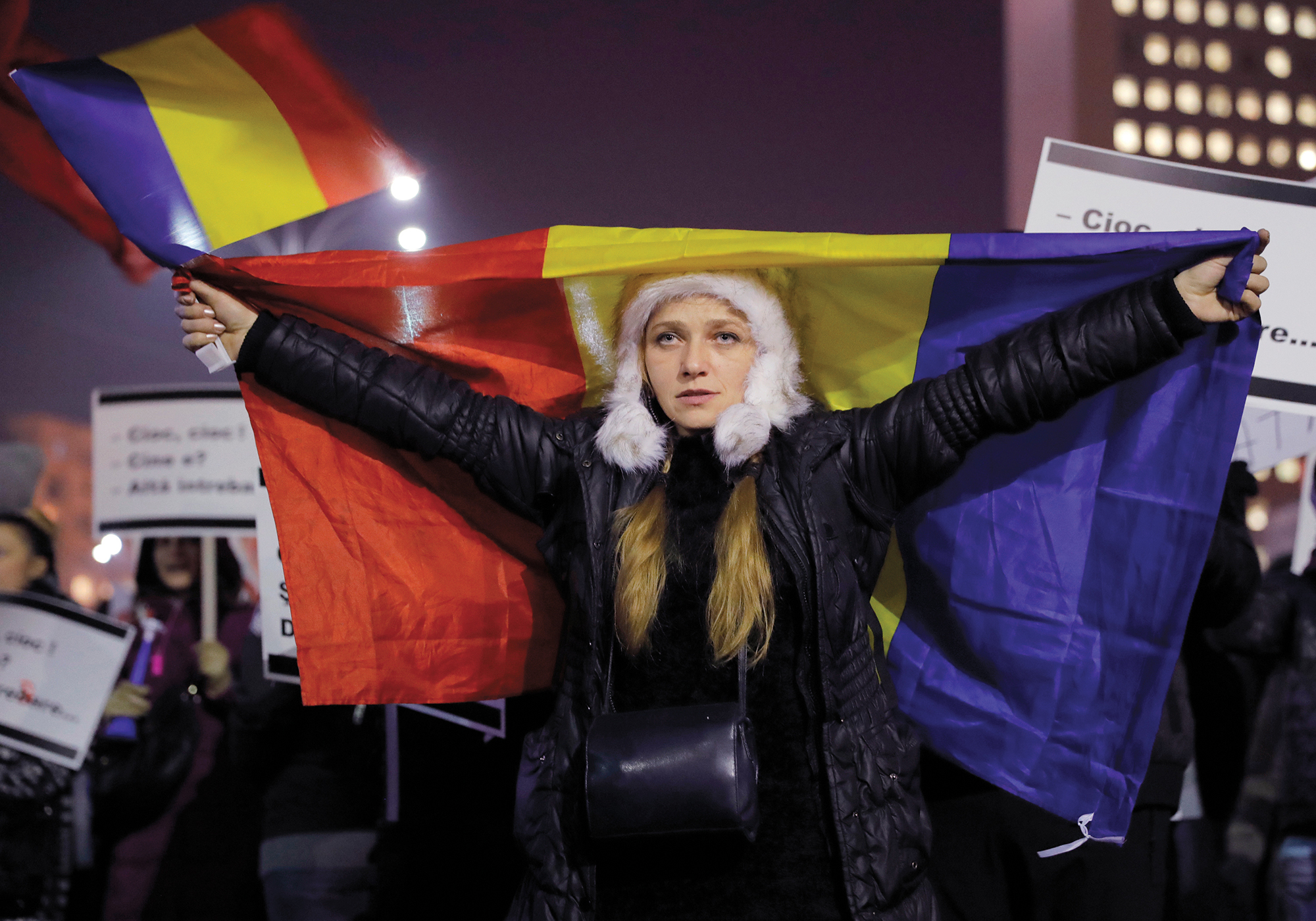
Reznick began his BC career a bit at sea. His interest was literature and politics, but it seemed to him that the field was dominated by a narrow, predictable set of themes. “Any time I would read an article, I thought, ‘I feel like I’ve read this article at least a dozen times,” he says. “I felt that literary scholars had either forgotten or hastily dismissed questions of citizenship and autonomy and political life.” His participation in the Clough Center’s interdisciplinary workshops revealed to him new ways of thinking about politics and literature. “The Clough experience has been so helpful to me because I am really trying to work at the disciplinary boundaries between literary studies and political theories, philosophy and historical analysis,” he says. Reznick’s thesis explores the impact that shifting conceptions of democracy had on literature in the years between the ratification of the US Constitution and the Civil War. He analyzes not only novels, short stories, and poems, but also essays, political speeches, oratory, and slave narratives.
Perju’s vast connections are of great value to such thinkers. He is a great scholarly matchmaker, known to go out of his way to convene people whose interactions with each other will likely spark new thinking. He once brought a scholar from the University of Toronto to participate in a graduate student’s workshop because he thought her input would be germane, for example.
Michael Franczak, a Graduate Fellow in the Clough Center, has also been a beneficiary of Perju’s network. “Vlad has a big Rolodex,” Franczak says. “He knows a lot of very smart, important people, and has provided us with some tremendous opportunities to meet some of them. I have met the former prime minister of Greece, former president of Ireland. I have met a US Attorney General, and more. Vlad is very insistent on creating opportunities for us that advance our careers and really make the center a vehicle for advanced graduate students on campus.”
If Perju is helping students like Franczak, a doctoral candidate in history working on a dissertation on economics and human rights in 1970s US foreign policy, to advance their careers, he is also showing them how to advance knowledge. For example, while researching the Bretton Woods Conference of 1944, which resulted in the creation of the International Monetary Fund (IMF) and the World Bank, Franczak unearthed archival material that provided new evidence of India, China, Australia, and New Zealand having had a greater impact on the development of the IMF than was previously thought. His paper on the subject was accepted at a conference in the Netherlands. The center flew Franczak to attend. “Out of that conference came a new book that significantly reinterprets very important events,” Franczak says. It’s called Global Perspectives on the Bretton Woods Conference and the Post-War World Order (Palgrave MacMillan 2017). Franczak has a chapter in it.
Similarly, when Martin Bernales, a doctoral student in philosophy, approached Perju about a conference on the topic of violence that he was organizing at BC, it didn’t matter to Perju that he didn’t know Bernales or that Bernales was not involved with the Clough Center at the time. He immediately offered Bernales the resources of the center, believing that violence, and specifically the distinction between legitimate and illegitimate forms of violence, is central to understanding constitutional democracy. Perju saw in Bernales’ proposal a chance for Clough to explore that topic—which has a long history in legal and political thought—through the arts and other social sciences. And he helped Bernales connect with an Israeli filmmaker who was living in France, a move that led to a film festival becoming a centerpiece of the conference.
Bernales has since joined the Clough Center as a Graduate Fellow. “What I see in Vlad is a real passion for learning and understanding,” says Bernales, who practiced criminal law in Chile. “He is a very well-trained lawyer, but he knows that the law doesn’t respond to everything. There is sort of, I would say, a kind of urgency in him to understand and also to share with others this quest.”
“We are very fortunate,” says BC Law professor Barrozo, “for being in a university that is not shying away from the challenges to constitutional democracy, that we have a center that places us on the forefront of facing those challenges, and that we have, in the mind of Vlad Perju, a mind whose scope matches the dimensions of the problem here. Vlad Perju is an extraordinary mind, and that is very rare to come about.”


